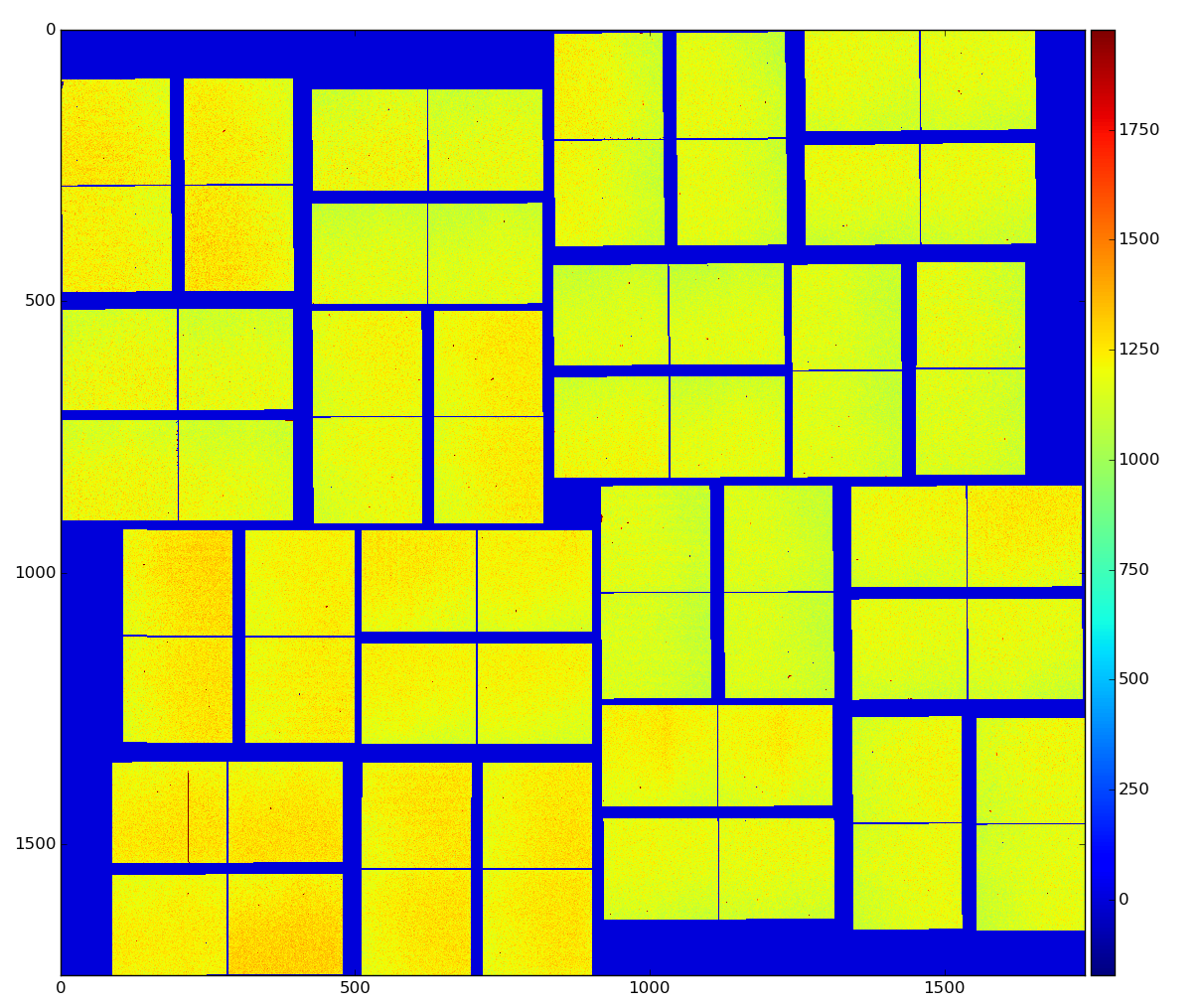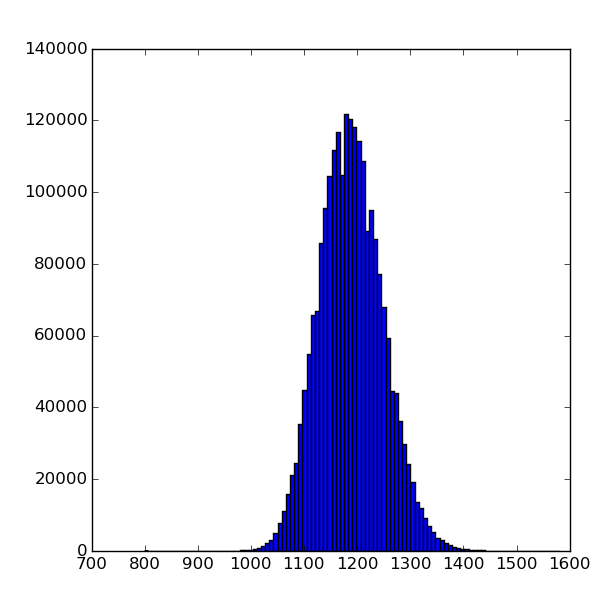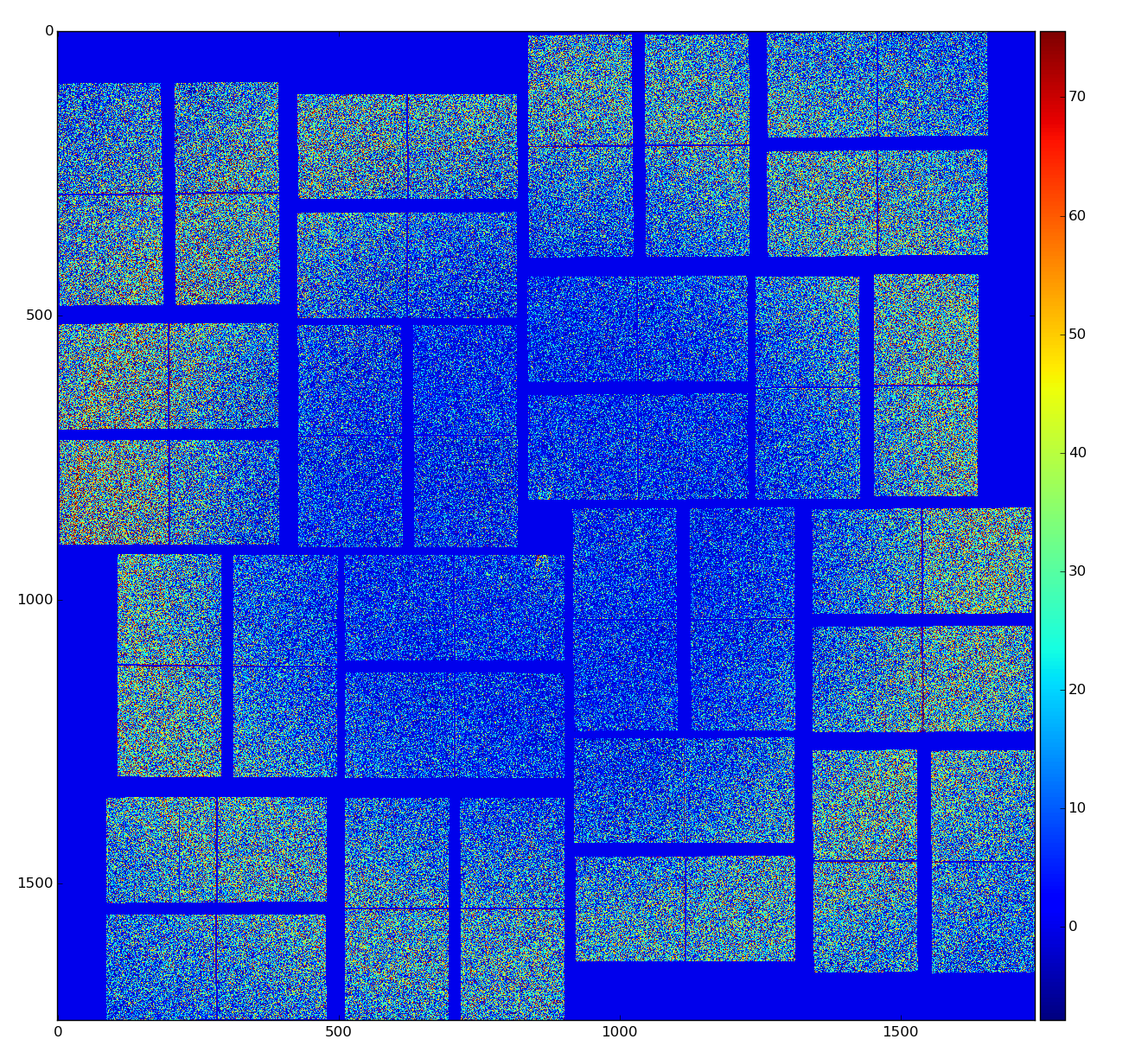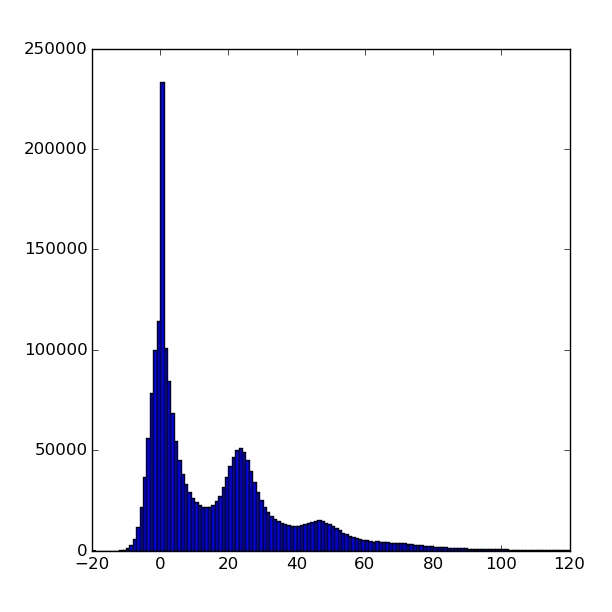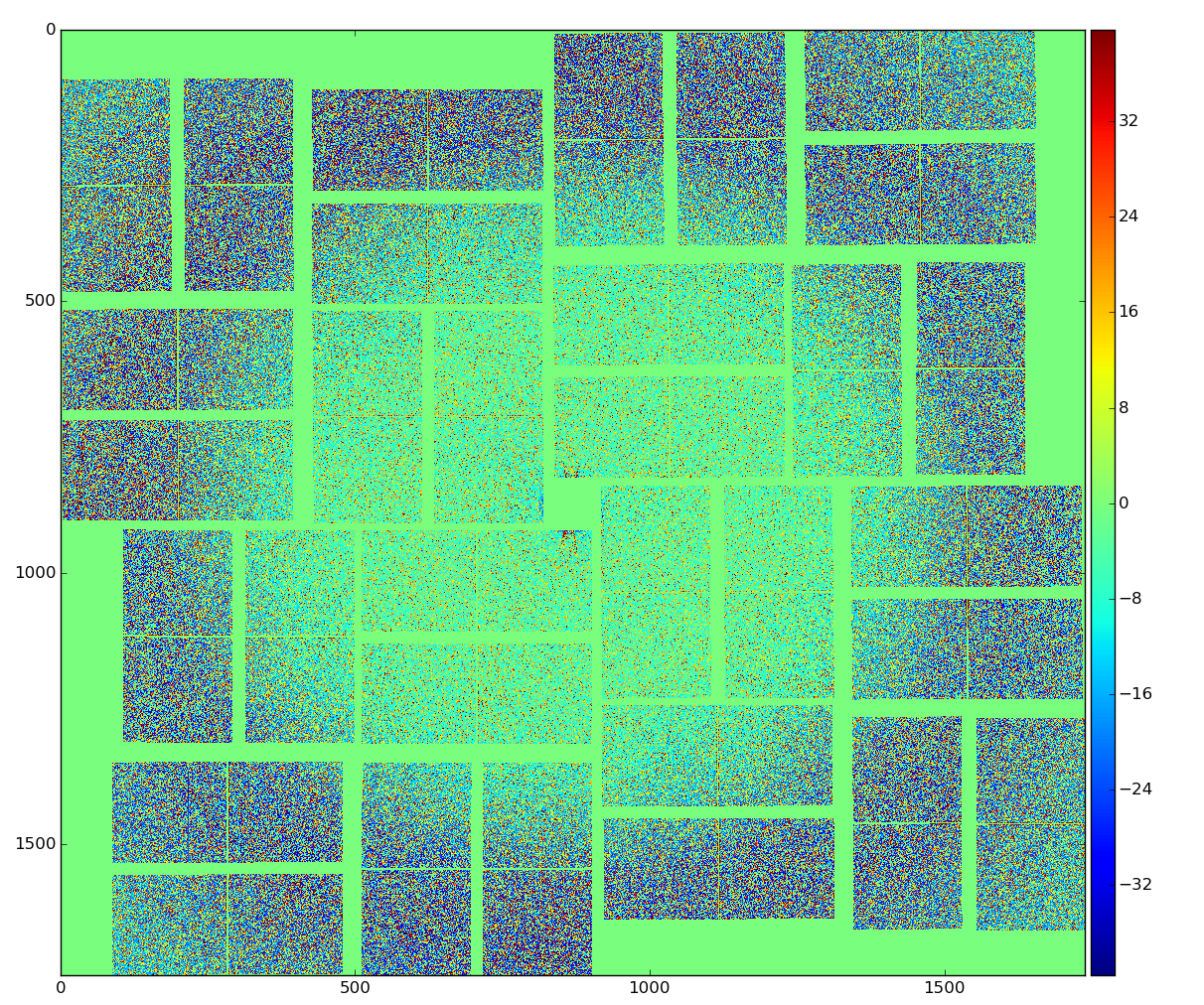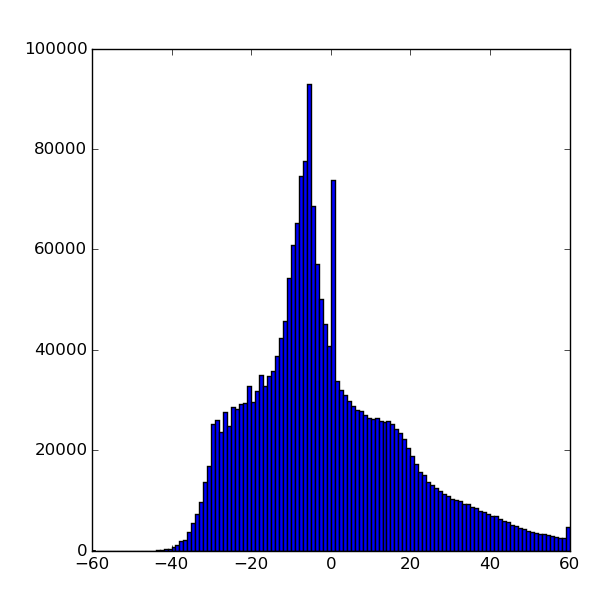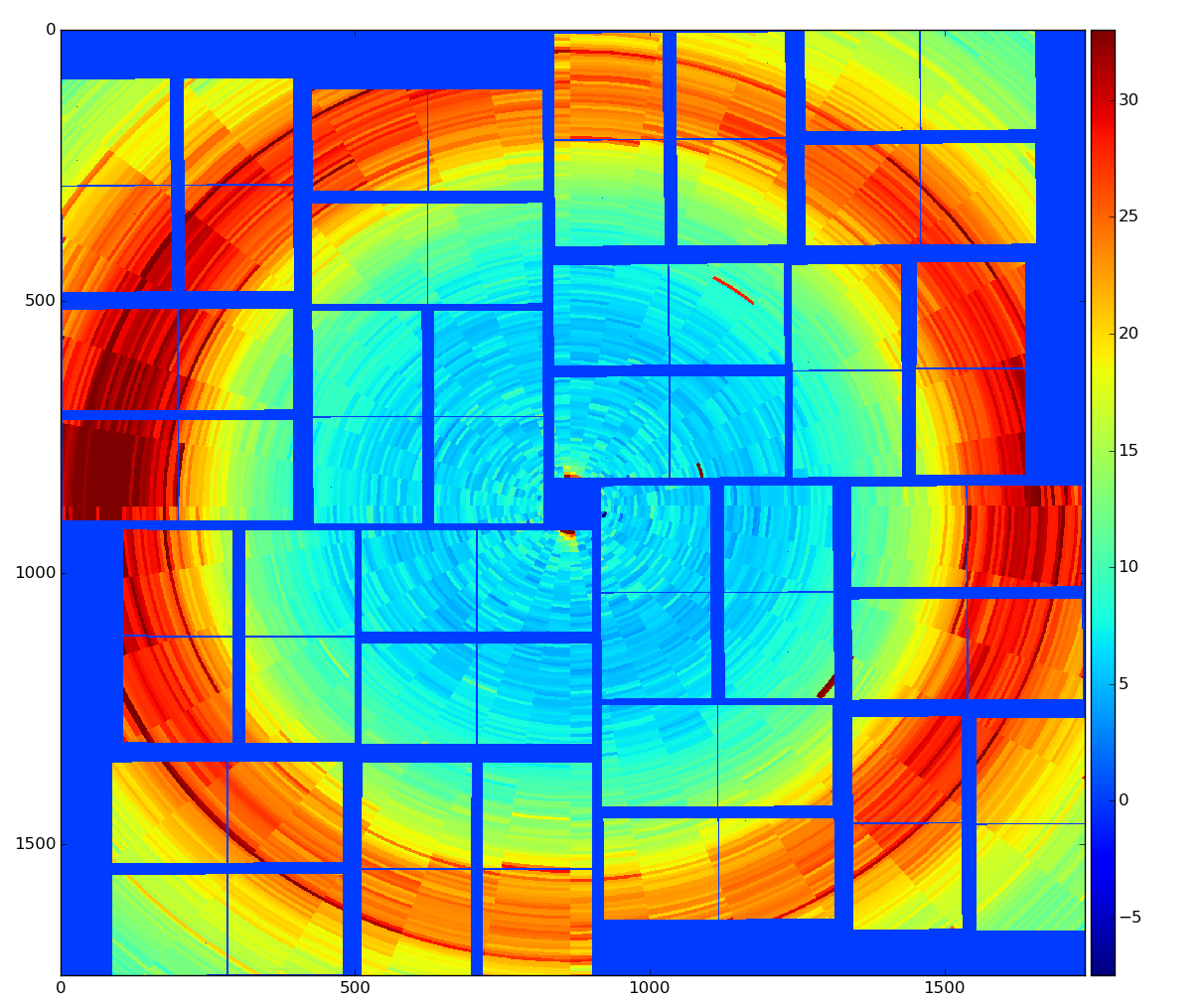Compression methods supported by HDF5
HDF5 supports
- gzip (deflate), gzip - CLI, zlib - API
- SZIP, n-bit, scale-offset, and shuffling (with deflate) compression filters. SZIP Compression in HDF
- Users defined compression filters Third-party compression filters
- LZF
gzip
file to file compression
gzip -c test.xtc > test.xtc.gz -rw-r--r-- 1 dubrovin br 168126152 Jan 23 14:48 test.xtc -rw-r--r-- 1 dubrovin br 88829288 Jan 23 14:51 test.xtc.gz compression factor = 1.89, time 30sec
zlib in mempry compress/decompress single cspad image
exp=cxitut13:run=10 event 11:
Array entropy is evaluated using formula from Entropy (information_theory).
Raw data
Calibrated data
calibrated data were obtained using det.calib(...) method, which essentially subtracts pedestals and apply common mode correction to raw data
Calibrated and radial-background subtracted data
binned background shape:
Entropy of low and high bytes
Compression in HDF5
GZIP
"A number of compression filters are available in HDF5. By far the most commonly used is the GZIP filter. "
dset = f.create_dataset("BigDataset", shape=(32,185,388), dtype=np.int16, chunks=(1,185,388), compression="gzip")
>>> dset.compression
'gzip'
>>> dset.compression_opts
9
SZIP
"SZIP is a patented compression technology used extensively by NASA. Generally you only have to worry about this if you’re exchanging files with people who use satellite data. Because of patent licensing restrictions, many installations of HDF5 have the decompressor, but compressor is disabled."
dset= myfile.create_dataset("Dataset3", (1000,), compression="szip")
SZIP features:
- Integer (1, 2, 4, 8 byte; signed/unsigned) and floating-point (4/8 byte) types only
- Fast compression and decompression
- A decompressor that is almost always available
LZF
Lempel-Ziv dynamic dictionary compression
LibLZF by Marc Lehmann is designed to be a very small, very fast, very portable data compression library for the LZF compression algorithm.
"For files you’ll only be using from Python, LZF is a good choice. It ships with h5py; C source code is available for third-party programs under the BSD license. It’s optimized for very, very fast compression at the expense of a lower compression ratio compared to GZIP. The best use case for this is if your dataset has large numbers of redundant data points."
dset = myfile.create_dataset("Dataset4", shape=(32,185,388), dtype=np.int16, chunks=(1,185,388),compression="lzf")
LZF features:
- Works with all HDF5 types
- Fast compression and decompression
- Is only available in Python (ships with h5py); C source available
Extra filters in HDF5
SHUFFLE
Treats low and high bytes separately
>>> dset = myfile.create_dataset("Data", shape=(32,185,388), dtype=np.int16, chunks=(1,185,388), compression="gzip",
shuffle=True)
- Available with all HDF5 distributions
- Very fast (negligible compared to the compression time)
- Only useful in conjunction with filters like GZIP or LZF
FLETCHER32 Filter
Check-sum
dset = myfile.create_dataset("Data2", shape=(32,185,388), dtype=np.int16, chunks=(1,185,388), fletcher32=True, ...)
>>> dset.fletcher32
True
FLETCHER32 features:
- Available with all HDF5 distributions
- Very fast
- Compatible with all lossless filters
gzip default compression_opts level=4 raw: gzip t1(create)=0.003280(sec) t2(+save)=0.216324(sec) input size=4594000(byte) ratio=1.583 shuffle=False fletcher32=False raw: gzip t1(create)=0.003025(sec) t2(+save)=0.146706(sec) input size=4594000(byte) ratio=1.958 shuffle=True fletcher32=False calib: gzip t1(create)=0.002738(sec) t2(+save)=0.168040(sec) input size=4594000(byte) ratio=2.072 shuffle=False fletcher32=False calib: gzip t1(create)=0.002926(sec) t2(+save)=0.178174(sec) input size=4594000(byte) ratio=2.188 shuffle=True fletcher32=False calib: gzip t1(create)=0.002579(sec) t2(+save)=0.182965(sec) input size=4594000(byte) ratio=2.187 shuffle=True fletcher32=True calib: lzf t1(create)=0.003225(sec) t2(+save)=0.100822(sec) input size=4594000(byte) ratio=1.351 shuffle=False fletcher32=False calib: lzf t1(create)=0.002815(sec) t2(+save)=0.086916(sec) input size=4594000(byte) ratio=1.473 shuffle= True fletcher32=False raw: lzf t1(create)=0.003125(sec) t2(+save)=0.108339(sec) input size=4594000(byte) ratio=1.045 shuffle=False fletcher32=False raw: lzf t1(create)=0.003071(sec) t2(+save)=0.075530(sec) input size=4594000(byte) ratio=1.698 shuffle= True fletcher32=False Compression filter "szip" is unavailable Compression filter "lzo" is unavailable Compression filter "blosc" is unavailable Compression filter "bzip2" is unavailable
Igor's compressor
https://pswww.slac.stanford.edu/svn-readonly/psdmrepo/
Compressor designated for LCLS detector uint16 data:
- estimates dataset spread,
- use 16-bit and 8-bit words to save data.
Features
- Optimized to work with 16-bit detector data only (not with xtc or hdf5 files containing metadata).
- By design Hist16 compression factor ≤2.
- Single array of data is split and processed in multi-threads (inside compression algorithm).
- Igor statement: up to ~two order of magnitude faster than gzip.
- Igor thinks that further specialization of data (separation of signal and background regions between threads) may improve compression factor.
Matt's Hist16 and HistN compressors
Available in external package pdsdata/compress/
- Hist16 - the same as Igor's compressor, but does not use multi-threading - slow
- HistN - developed by Matt, uses 16-bit and 8,7,6...-bit words, compression factor HistN upto ~2.
SZ compressor from Argonne
https://github.com/disheng222/SZ
-> Clone or download -> Download ZIP -> installed under ~/lib/sz/sz-1.4.9/
Run tests like:
~/lib/sz/sz-1.4.9/SZ-master/example]$ ./testfloat_compress sz.config testdata/x86/testfloat_8_8_128.dat 8 8 128
- works with float and double.
- int16 and uint16 not implemented
compression factors ~ 56, 110, and 49 for
- testfloat_8_8_128.dat,
- testdouble_8_8_128.dat, and
- testdouble_8_8_8_128.dat, respectively.
But for data with VERY NARROW SPECTRA:
testfloat_8_8_128.txt mean=1.000000 std=1.232407
testdouble_8_8_128.txt mean=1.000000 std=1.254261
testdouble_8_8_8_128.txt mean=1.300935 std=0.502083
References
- Using compression in HDF5
- Szip Compression in HDF
- Third-party compression filters
- HDF5 Tutorial
- HDF5 Software Documentation
- Using HDF5 filters
- HDF5 Data Compression Demystified
- gzip - CLI, zlib - API
- Entropy (information_theory)
- Dictionary compression
- Python and HDF5
- LibLZF
- SZ compressor (sz-1.4-user-guide.pdf) Authors: Sheng Di, Dingwen Tao, supervisor: Franck Cappello
- 2017-02-24-Report-of-SZ-Lossy-Compression-on-EXAFEL-Datasets-v5.pdf
- 2013-04-17-igor-pyana_xtc_decompression_status.pdf, psdmrepo
- 2017-03-21-Lossless-compression.pdf
- 2017-09-27-Lossless-compression.pdf - on Users mtg
